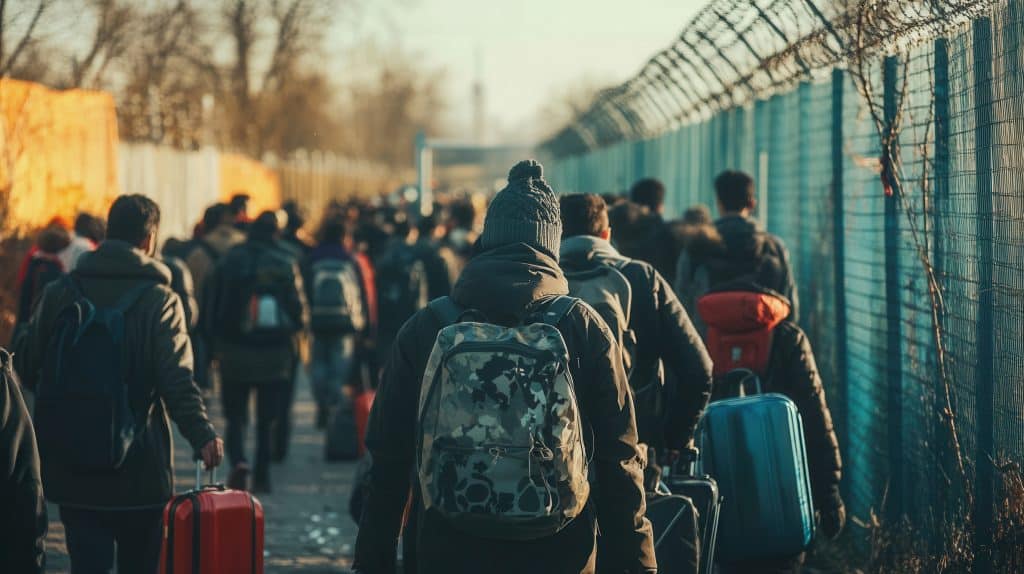U.S. authorities deport migrants to South Sudan: the story unfolds

Anúncios

A federal court issued an order temporarily blocking the deportations; however, U.S. authorities deport migrants to South Sudan despite these legal directives.
Anúncios
This clash between judicial rulings and enforcement agencies has intensified public scrutiny.
The ruling highlighted concerns about the risk of immediate harm, arguing that individuals deported to South Sudan could face targeted violence, economic deprivation, or political persecution—issues well documented by international observers.
background on U.S. migration policies
Understanding the background on U.S. migration policies is crucial for comprehending the current climate regarding deportations. These policies have evolved over decades, shaped by various laws and regulations.
Anúncios
The Immigration and Nationality Act (INA) of 1952 was one of the first comprehensive laws governing immigration in the U.S. This act established a system that prioritized family reunification and skilled immigrants.
Over time, adjustments were made to address the changing political and economic landscape.
Key Components of U.S. Migration Policies
Some foundational elements include:
- Quota systems: Limiting the number of immigrants from specific countries.
- Refugee and asylum policies: Offering protection to those fleeing persecution.
- Enforcement measures: Increased border security and interior enforcement.
- Pathways to citizenship: Providing routes for legal residency and naturalization.
Throughout the years, various administrations have shifted focus, emphasizing different aspects of these policies.
For example, the Deferred Action for Childhood Arrivals (DACA) program was introduced in 2012 to protect undocumented immigrants who arrived as children, showcasing a more humane approach at that time.
Conversely, recent years have seen a tightening of enforcement, with stricter measures that have drawn criticism both domestically and internationally.
The balance between security and humanitarian considerations remains a contentious issue.
As the current climate suggests, these policies not only affect immigrants and their families but also raise questions about human rights and moral responsibilities.
The evolution of these laws continues to shape the experiences of millions seeking a better life.
details of the court order
The details of the court order regarding the deportation of migrants to South Sudan provide significant context to the unfolding situation.
Recently, a federal court ruled that certain deportations must be halted to protect individuals from potential harm upon their return.
This highlights the legal framework that governs immigration in the U.S. The ruling specifically addressed concerns about the safety of deportees, noting that returning migrants could face dire consequences in their home country.
The court emphasized that the U.S. must consider humanitarian aspects when enforcing deportation orders.
Key Points of the Court Order
Some essential aspects of the court order include:
- Suspension of deportations: The order prevents immediate deportations of certain migrants.
- Human rights considerations: The ruling is based on the risk of persecution and violence in South Sudan.
- Legal appeals: Update on the status of ongoing legal challenges regarding deportation practices.
- Impacts on vulnerable populations: Special attention to families and individuals facing serious risks.
These details shed light on the complexities of immigration law and the balance that courts must strike between enforcing laws and protecting human rights.
As we explore the implications of this ruling, it becomes clear that legal interventions play a crucial role in shaping the experiences of migrants.
Moreover, this situation not only affects those directly involved but also raises questions about how U.S. immigration policies will be applied in the future.
The tension between the enforcement of deportation and the need for compassion represents a significant challenge for authorities.
reactions from human rights organizations

The reactions from human rights organizations regarding the deportation of migrants to South Sudan have been significant and vocal.
These organizations have expressed deep concern over the implications for the safety and well-being of those being deported.
Human rights advocates argue that the U.S. government must prioritize the protection of vulnerable populations.
Many organizations have issued statements condemning the deportations, emphasizing that they expose individuals to grave dangers in their home country.
Key Concerns from Human Rights Groups
Several major concerns have been highlighted:
- Risk of Violence: Many deportees may face violence or persecution upon their return.
- Lack of Due Process: Organizations argue that deportations are often carried out without adequate consideration of individual circumstances.
- Impact on Families: Deportations can separate families, creating emotional and economic hardships.
- Legal Rights: Advocates stress the importance of respecting the legal rights of migrants during the deportation process.
Additionally, international bodies have also weighed in, suggesting that such actions may violate international laws. They call for greater accountability and transparency in the deportation process.
The effects of these reactions are profound. They not only highlight the ethical implications of U.S. deportation policies but also serve to mobilize public support and activism.
As human rights organizations continue to rally against these practices, conversations about the broader impacts on migrant communities are becoming increasingly urgent.
implications for the migrants
The implications for the migrants affected by U.S. deportation policies to South Sudan are significant and multifaceted. Many individuals face dangerous circumstances upon their return, raising serious humanitarian concerns.
One crucial aspect is the immediate threat to safety. Migrants who are deported may encounter violence, persecution, or instability in their home country.
This is especially true for those who fled conflicts or oppressive regimes, as conditions often remain dire.
Challenges Faced by Deportees
Some of the main challenges include:
- Reintegration Issues: Many deported migrants struggle to reintegrate into their communities after being away.
- Loss of Support Networks: Deportation often leads to the loss of family and social support systems.
- Economic Hardships: Deportees may find it difficult to secure employment or housing.
- Psychological Impact: The trauma of deportation can lead to mental health issues, including anxiety and depression.
Furthermore, deported migrants face legal hurdles. Many are barred from re-entering the U.S. for significant periods, limiting their opportunities for a better life. This creates a cycle of hardship that is hard to escape.
The vagaries of U.S. immigration policy can transform lives overnight, leaving many feeling hopeless.
Additionally, family separation is a profound issue. Many deportees leave behind children or spouses in the U.S., creating emotional and financial instability for families on both sides.
This situation raises questions about the responsibilities of governments to protect vulnerable populations while enforcing immigration laws.
future of U.S. deportation policies

The future of U.S. deportation policies is a topic of great concern and debate, especially in light of recent events. These policies are constantly evolving, influenced by changing political landscapes, public opinion, and legal challenges.
With human rights organizations raising alarms about the treatment of migrants, there is increasing pressure on lawmakers to reform existing policies.
Many advocates argue for a shift towards more humane practices, emphasizing the need to protect vulnerable populations rather than simply enforcing harsh deportation measures.
Potential Changes on the Horizon
Several factors could impact the future of deportation policies:
- Legislative Reforms: There may be proposals for new laws that prioritize humanitarian considerations in deportation cases.
- Judicial Decisions: Ongoing court rulings could further shape the legality of deportations and the rights of migrants.
- Public Sentiment: As public awareness grows, pressure to address immigration reform may lead to significant policy shifts.
- International Relations: U.S. relations with countries like South Sudan may also influence how deportations are handled.
Current discussions focus on finding a balance between ensuring national security and protecting human rights.
This balancing act will likely shape policies moving forward, reflecting the country’s values and obligations to those seeking safety.
Additionally, advancements in technology are also becoming part of the conversation.
From improved tracking systems to innovative ways to process asylum claims, future policies may incorporate technological solutions in their frameworks, potentially streamlining immigration processes.
Conclusion
The controversy surrounding how U.S. authorities deport migrants to South Sudan reveals ongoing tension between immigration enforcement and humanitarian responsibility.
Deportees face dangerous conditions, and the execution of removals despite federal court orders raises pressing questions about legal accountability.
Human rights advocates argue that removals fail to consider the volatility, conflict, and instability facing individuals upon arrival.
Many call for stronger legal safeguards, compassionate enforcement, and comprehensive reform to protect vulnerable communities.
As this issue evolves, policymakers and advocates continue to debate how the United States should respond.
For context, recent reporting confirms that Temporary Protected Status for South Sudan was terminated, intensifying urgency around deportation decisions and migrant safety (source: CBS News: https://www.cbsnews.com/news/temporary-protected-status-south-sudan-terminated/).
Holistic reform—balancing legal enforcement with safety and dignity—will be essential to ensuring a just and humane immigration future.
FAQ – Frequently Asked Questions about U.S. Deportation Policies
What are the main concerns regarding U.S. deportation policies?
The key concerns include human rights violations, the safety of migrants upon return, and the lack of due process in deportation cases.
How do human rights organizations respond to deportations?
Human rights organizations actively advocate for the protection of migrants, condemning deportations that could lead to violence or persecution in their home countries.
What potential reforms are being discussed for deportation policies?
Proposals may include laws that prioritize humanitarian considerations, enhance legal protections for migrants, and improve the deportation process.
Why is public engagement important in the context of deportation policies?
Public engagement is crucial as it raises awareness, encourages advocacy for reform, and influences policymakers to consider the human impact of deportation.
Liked the article?





